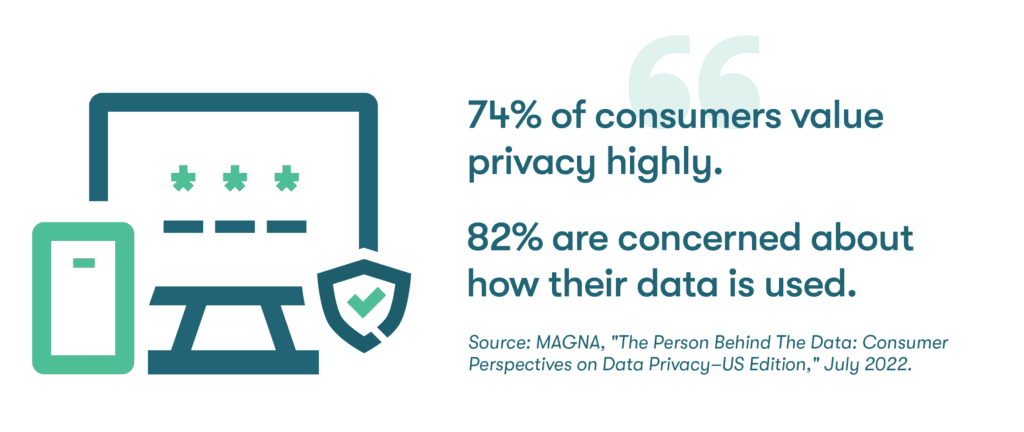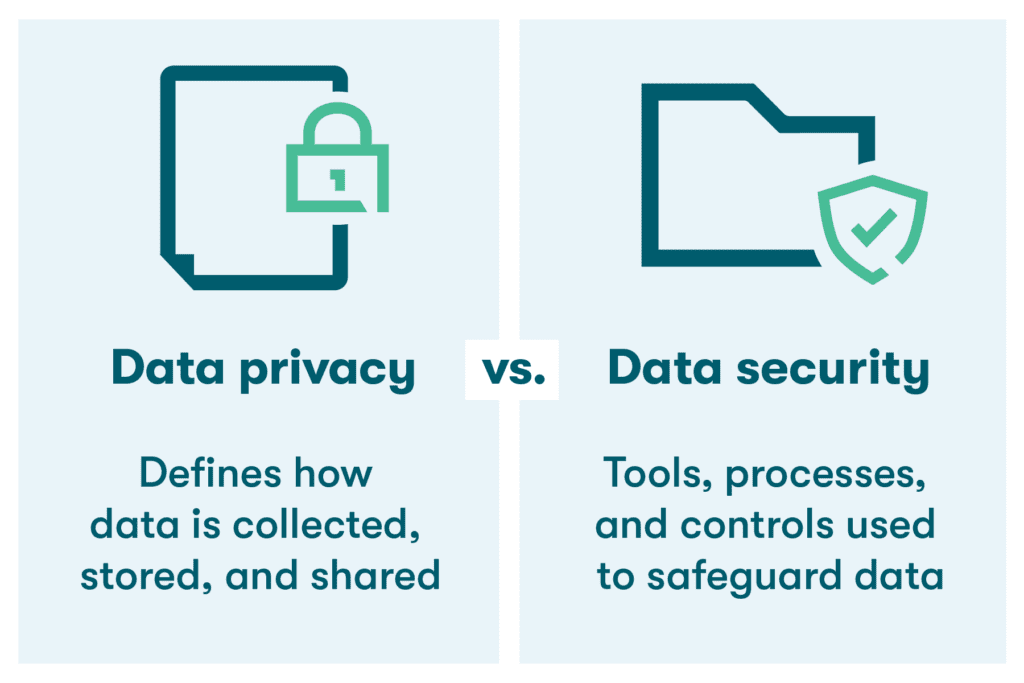What Is Data Privacy & Why Is It Important?
Data privacy has been a frequently discussed topic in recent years, as data sharing over the internet, high-profile data breaches, and government regulations have converged to highlight the importance of information privacy and informed consent. So what is data privacy, and why is it important?
Want to learn more about using Dashlane Password Manager at home or at work?
Check out our personal password manager plans or get started with a free business trial.
What is data privacy?
The definition of data privacy is our ability to control what, where, and how our personal or confidential information is collected, stored, or shared. Data privacy was important long before the digital age, but the internet and electronic records have changed the meaning of data privacy and increased interest in:
Privacy of online activity
Internet service providers continually track your online activity and IP address, even when you use private or incognito browsing modes. Digital privacy laws and regulations determine how information gathered during our browsing sessions can and can’t be used and how we’re informed about the process.
New search engine providers like Neeva are responding to public demand by offering completely private, ad-free browsing services. Dashlane Premium subscribers get a year of free access to Neeva Unlimited, which offers best-in-class privacy tools and other exclusive benefits.
Companies protect our private data
The growth of cloud computing, e-commerce, telemedicine, and other online services highlights the importance of personal data privacy practices to protect our identity and private information from cybercriminals and prevent consumer data from being used unethically.
Personal data privacy
Personal information includes things like your name, address, phone number, and Social Security number that can be used to identify you. Unlike online preferences or browsing history, personal information is also relevant outside the digital world. Financial data, medical records, and employee files are some of the many forms of personal information that must be protected.
Company privacy policies
Data privacy and protection are important to businesses in many ways. Maintaining the privacy of company information (intellectual property), employee data, and information shared with customers and clients is essential. A data privacy policy sets ground rules for tracking, storing, and sharing customer data collected on the organization’s website. This policy also helps businesses establish compliance with a growing list of privacy laws.
Dashlane is dedicated to creating software that helps you control your information online. We include plain language summaries that make our data collection, use, and sharing practices easier to understand in our Dashlane Privacy Policy.
Why is data privacy important?
Data privacy helps you control what information you choose to keep personal. All individuals have the right to prevent their personal information from being used or shared without their consent, even if this sharing wouldn’t potentially lead to data theft or other cybercrimes. Data privacy also helps companies and individuals to:
Comply with privacy laws
Due to the importance of data privacy, a long list of state, federal, and international laws have been established to protect our privacy online and elsewhere. Important data privacy and security laws and regulations include:
- Children's Online Privacy Protection Act (COPPA): With more children going online, this U.S. federal law was established to ensure parental consent is granted before any personal information is collected from children under the age of 13.
- Health Insurance Portability and Accountability Act (HIPAA): This federal law protects the privacy of healthcare information collected by doctors, hospitals, insurance companies, or employers.
- General Data Protection Regulation (GDPR): This European regulation sets standards for the collection and use of personal information in Europe. This includes individual rights for opting out of information collection or requesting to have information deleted.
- California Consumer Privacy Act (CCPA): Established in 2018, this California state law gives consumers more control over the personal information that businesses collect about them, including the right to know what information is collected and the right to opt out of the sale or sharing of their personal information.
Prevent identity theft
Identity theft is one of the most serious cybercrimes related to personal data privacy and security. Armed with just a few key pieces of personally identifiable information (PII), like your name, driver’s license number, and Social Security number, an identity thief can begin accessing credit lines in your name, stealing your tax refund, or draining your bank account.
Since many identity theft victims don’t realize what’s happened until after the damage is done, dark web monitoring is a recommended practice used to scan the depths of the internet for your personal information and notify you if something sensitive is found.
Protect consumers
Consumer protection is the driving force behind many privacy laws. It is also an important factor for companies establishing their policies, as 74% of consumers in a recent study were shown to value privacy highly, and 82% were concerned about how their data is gathered and used. A clear impact on brand value is steering more companies toward transparent and ethical data privacy policies.

Reduce the impact of hacking and data breaches
While a hack is an intentional attack used to obtain unauthorized access, a data breach is the potential result of the attack. Hackers typically set out to steal private data from people, like passwords, credit card numbers, and banking information, or to obtain private information from companies, like intellectual property, financial records, and customer data. In either case, strong data privacy and security practices can be an effective deterrent.
As a protector of customer data, Dashlane realizes the importance of a formalized data privacy strategy. Learn more about our privacy stance and how we apply it in A Conversation About Privacy: Dashlane’s “Five Laws.”
The 3 types of data protection
Data privacy and security are closely related to other concepts like data handling and data sovereignty. The overarching concept of data protection brings together 3 important elements:
Traditional data protection
Traditional data protection encompasses basic computer network practices that have existed for decades. This includes data archiving and retention plans that are also relevant for paper records. Traditional data protection also includes network backup practices, data replication, and RAID and erasure coding to create more flexible data storage options.
Data security
The data security element of data protection includes the tools used to protect private data from unauthorized access, theft, or corruption. Data security also includes the physical security methods used to protect areas where private data is stored and authentication methods that ensure only recognized individuals can view or move files. Additional cybersecurity tools used to enhance data security include:
- Encryption to scramble data into an unrecognizable format, making it less vulnerable to hacking and data breaches.
- Password managers to ensure private accounts are protected by strong, unique, and securely stored passwords that are difficult for hackers to crack.
- VPN to mask the IP address and encrypt all data going into or out of a device while routing it through a secure portal.
Data privacy
Data privacy is more than a collection of software and tools used to ensure privacy online. Data privacy refers to the proper handling of any sensitive data, including personal data, financial data, and intellectual property. The laws, policies, and best practices designed to protect data privacy are based on when and how personal data can be collected and shared.
Data privacy vs. data security–know the difference
That brings us to the relationship between data privacy and data security. Although they aren’t the same, each plays an important role in maintaining information privacy and legal compliance.
The differences
Data privacy defines the guidelines for handling and collecting data based on its type and importance, while data security is concerned with the cybersecurity tools, processes, and controls used to safeguard the data. Data security tools include firewalls, data encryption, access control systems, and network monitoring software. Data security protects data from cyber threats, while data privacy defines the ethical and responsible use of that data.

Why security is needed to preserve privacy
Data privacy and data security are like two sides of the same coin. For example, if your organization collects personal information from online shoppers to complete their orders, your privacy policy will include strategies for long and short-term data storage, information sharing with third parties, and customer consent to provide their information. Once you’ve established these ground rules, you need to make sure you have adequate data security tools and practices in place to protect customer data from internal and external threats.
Data protection applies to both
Data protection is the umbrella covering both data privacy and data security. The original definition of data protection, rooted in traditional methods, focused on maintaining data availability through the network backup process. As internet use, online banking, and e-commerce have exploded, data protection has expanded to include data preservation, data privacy, and data security. Data preservation activities are focused on keeping either physically or electronically stored files intact.
How Dashlane prioritizes data privacy
Dashlane provides intuitive, secure password generation, effortless Autofill, and protected vaults for password storage and sharing. We safely encrypt and protect all your data and metadata, not just your passwords. If Dashlane were ever breached, your information would remain protected. Additional tools like Password Health scores, 2-factor authentication (2FA), and Dark Web Monitoring provide an enhanced level of security.
Our patented zero-knowledge architecture ensures that no one—not even Dashlane—has access to your data. In keeping with the Dashlane privacy policy, we will never ask for your credentials or store your Master Password, and you’ll always have a choice about how cookies and other information are used.
Embracing data privacy means handling sensitive data responsibly to protect yourself and those around you. Learn how to work securely by keeping personal and company data separate in Our Guide to Data Privacy.
References
- Dashlane, “How Safe Is Incognito Mode/Private Browsing, Really?” February 2020.
- Dashlane, “Dashlane and Neeva Are Partnering to Make Online Searching More Secure,” November 2022.
- ZDNet, “How to create a privacy policy that protects your company and your customers,” August 2020.
- Epic.org, “Children’s Privacy,” 2023.
- PrivacyPolicies, “Health Insurance Portability and Accountability Act (HIPAA),” July 2022.
- Investopedia, “General Data Protection Regulation (GDPR) Definition and Meaning,” November 2020.
- State of California, “California Consumer Privacy Act (CCPA),” February 2023.
- My Banktracker, “How Much Information is Needed for Someone to Steal Your Identity?” February 2023.
- Dashlane, “How to Shine a Light on the Dark Web,” June 2022.
- Ketch, “The Person Behind The Data,” 2023.
- Dashlane, “Data Breach or Hack? Know the Difference,” June 2021.
- Dashlane, “A Conversation About Privacy: Dashlane’s Five Laws,” November 2021.
- Qumulo, “Erasure Coding vs. RAID Explained: Methods for Data Protection,” December 2021.
- Dashlane, “How to Conduct a Security Audit in Five Steps,” 2023.
- Dashlane, “2-factor authentication (2FA) in Dashlane,” 2023.
- Thales, “A Brief History of Encryption (and Cryptography),” November 2022.
- Scalefusion, “5 Types of Data Security Tools Every Company Needs in 2023,” August 2022.
- Dashlane, “Putting Security First: How Dashlane Protects Your Data,” January 2023.
- Dashlane, “A Deep Dive into Dashlane's Zero-Knowledge Security,” June 2022.
- Dashlane, “Dashlane Privacy Policy,” 2023.
- Dashlane, “Our Guide to Data Privacy,” 2023.
Sign up to receive news and updates about Dashlane
